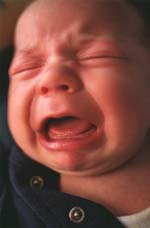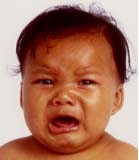 Colic in baby can usually be remedied with diet changes and attachment parenting measures. Diarrhea, constipation, rashes, and other symptoms signify food sensitivities.
Colic in baby can usually be remedied with diet changes and attachment parenting measures. Diarrhea, constipation, rashes, and other symptoms signify food sensitivities.
See also: When the Doctor Says GER
Infant colic and reflux are distressing for both parents and baby, but they can be relieved without drugs. Colic is a symptom of reflux or other eating problems. When is crying considered colic?
Consolable When crying is easily consolable with carrying and affection, then that is just what baby needs.
Inconsolable When crying is frequently inconsolable, beyond athletic bouncing sessions and extreme distraction techniques, one needs to look for something that is regularly causing pain. We are often given a “diagnosis” of colic, or more commonly today, reflux or GERD, for the frequently long-crying baby.

What is Colic? It’s a baby who cries a lot. At least that’s what we’re told, along with assurances that baby will “grow out” of it one day. The attuned parent, often sensing that their inconsolable baby is in pain, desires to do something more than just wait. Occasionally, the baby with colic is prescribed sedative drugs with potentially dangerous side effects. While posing risks to the infant, these generally do not address the source of the problem.
Since the development of new expensive drugs for gastric acid reflux, most crying babies are diagnosed with GER, or the more serious, GERD, standing for gastroesophageal reflux disease, and prescribed the new proton pump inhibitor drugs such as Prilosec and Prevacid. Parents often find that these provide little help, if any. Current studies reveal that there is great randomness to the symptoms used to diagnose GERD, that while the drugs will reduce acid in the stomach and esophagus they do not reduce baby’s colic symptoms or other symptoms, and that GERD drugs increase intestinal infections and pneumonia. While the GERD diagnosis and prescription of these drugs is lucrative, it sadly steers parents away from finding real solutions for their baby. Even if a medically induced reduction in acid helps to decrease baby’s symptoms, correcting the likely dietary cause will do more for the child’s long term health.
Common causes of colic in breastfeeding babies are broccoli, cauliflower, cabbage, onions, garlic, or spicy foods in mother’s diet. These can cause uncomfortable gas or irritation. Sometimes caffeine or chocolate are problematic as well. These are not food allergies, but simple gassy problems.
The number one cause of colic and reflux: Research proves that the number one cause of colic is intolerance to cow’s milk proteins in the diet of the breastfeeding mother or in formula. Corn, wheat, and soy are some other common offenders.
Other symptoms such as diarrhea, constipation, spitting-up, rashes, sleeplessness, or waking with screams go along with this picture. Sometimes chronic stuffiness and ear infections also stem from food sensitivities; again.
Studies Of the many studies on colic and food reactions, below are the average percentages from those that report actual numbers of recovery. Most use hydrolyzed formulas to “eliminate” cow’s milk proteins, but some harmful protein traces still remain in these. When babies who failed with hydrolyzed formulas were given elemental formulas (all allergenic proteins are completely broken up), 98% recovery was seen over all.
| Symptom | Cow’s milk | Multiple foods |
| ADHD | 80% | |
| Colic | 67% | 84% |
| Adding elemental diet recoveries for Colic |
98% | |
| Constipation | 71% | |
| Chronic ear infections | 86% | |
| Diarrheal diseases | 82% | |
| Migraines | 93% | |
| Sleeplessness | 94% |
Weighted averages of cases shown to respond to eliminating cow’s milk or multiple allergenic foods from the diet, taken from multiple studies (presented in the text of Baby Matters). Palmer, 2001.
Finding Out Blood and scratch tests are simply not reliable, and are often negative. Once other, rare medical conditions have been professionally ruled out for the chronically crying baby, dietary trials in search of offending foods will likely provide the solution that is needed. This topic is covered thoroughly inBaby Matters.

Nursing Mother Strict elimination of dairy and other offenders in the nursing mother’s diet will produce better results than elemental formulas, while helping the intestines to heal and maintaining immune protection and other benefits.
Lactose Lactose intolerance is almost never a true problem for a baby. When baby’s digestive tract is suffering from reactions to any food, or recovering from infection, lactase enzyme (that digests lactose) becomes temporarily reduced. Lactose intolerance tests will often show up positive in such a case, but lactose-free formula will only provide a partial recovery and lactose is a valuable sugar for baby’s brain development and immune protection. Mother’s milk is full of lactose. Until very recently, an infant born unable to digest this baby sugar would never live to pass on its genes. The incidence of true lactase enzyme deficiency in a baby is extremely rare.
GER or GERD The recent fad in colic diagnosis is GERD, or gastro-esophageal reflux disease. Food intolerance is well known to cause such reflux, as is stress, (like from prolonged bouts of crying), so we are back to our basic causes for colic.
Other Treatment Options Few parents have found help from the little drops sold for gas. Some may find herbal remedies to help. Acidophilus and other probiotics (not from dairy sources) have been shown to reduce some food intolerance and help re-establish intestinal balance after an assault on the system. There may also be reduction of intestinal reaction with the medically prescribed use of histamine-2 blockers, (like Zantac and Cimetidine), or anti-inflammatory agents, each of which block part of the intestinal assault. There is no substitution, however, for avoidance of the offending agents. When symptoms are merely reduced or masked, health-impairing intestinal assault continues, possibly with life-long ramifications.
Caring for Colic Lots of jiggling often helps to move painful bubbles through baby’s system. Tummy rubs may be responded to positively as well. The general rule for reacting to a crying baby who cannot be comforted is to simply hold them and validate their feelings. Yet when a child frequently suffers from painful bouts of colic, it may be more kind to help distract them from their pain, if and when possible.
BABY POOP book extensively covers the causes and treatments for colic, reflux, GERD, and food intolerances.

Great article.
There’s a lot of products out there and what I call “soft advice” on how to cure/ease colic but little on how to prevent it. There is a theory that proper breastfeeding prevents colic. It states that there are two kinds of milk in a breast. The fore milk and the hind milk. I do not know why it is mentioned rarely :/
We believe we avoided colic by properly breastfeeding. A few of our friends were not as lucky and they were helped either by fennel tea or by Biogaia drops.
Colic definitely are one of those things where it is better to be a bit paranoid and prevent them than to have to cure it.
My wife wrote a comprehensive article on the subject titled simply Colic